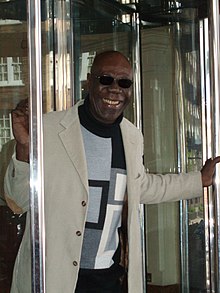Manu Dibango
| Manu Dibango | |
|---|---|

Manu Dibango in London, 2007
|
|
| Background information | |
| Birth name | Emmanuel N'Djoké Dibango |
| Born |
12 December 1933 Douala, French Cameroon |
| Genres | African Rumba, afrofunk, afrobeat, jazz, makossa, traditional |
| Occupation(s) | musician, song-writer |
| Instruments | saxophone and vibraphone |
| Years active | 1968–present |
| Website | www.manudibango.net |
Emmanuel "Manu" N'Djoké Dibango (born 12 December 1933) is a Cameroonian musician and song-writer who plays saxophone and vibraphone. He developed a musical style fusing jazz, funk, and traditional Cameroonian music. His father was a member of the Yabassi ethnic group, though his mother was a Duala. He is best known for his 1972 single, "Soul Makossa".
Dibango was born in Douala, Cameroon. His father, Michel Manfred N'Djoké Dibango, was a civil servant. The son of a farmer, he met his wife travelling by pirogue to her residence, Douala. A literate woman, she was a fashion designer, running her own small business. Both her ethnic group, the Duala, and his, the Yabassi, viewed this union of different ethnic groups with some disdain. Emmanuel had no siblings, although he had a stepbrother from his father's previous marriage who was four years older than he was. In Cameroon, one's ethnicity is dictated by their fathers, though he wrote in his autobiography, Three Kilos of Coffee, that he has "never been able to identify completely with either of [his] parents."
Dibango's uncle was the leader of his extended family. Upon his death, Dibango's father refused to take over, as he never fully initiated his son into the Yabassi's customs. Throughout his childhood, Dibango slowly forgot the Yabassi language in favour of the Duala. However, his family did live in the Yabassi encampment on the Yabassi plateau, close to the Wouri River in central Douala. While a child, Dibango attended Protestant church every night for religious education, or nkouaida. He enjoyed studying music there, and reportedly was a fast learner.
In 1941, after being educated at his village school, Dibango was accepted into a colonial school, near his home, where he learned French. He admired the teacher, whom he described as "an extraordinary draftsman and painter." In 1944, French president Charles de Gaulle chose this school to perform the welcoming ceremonies upon his arrival in Cameroon.
He was a member of the seminal Congolese rumba group, African Jazz, and has collaborated with many other musicians, including Fania All Stars, Fela Kuti, Herbie Hancock, Bill Laswell, Bernie Worrell, Ladysmith Black Mambazo, King Sunny Adé, Don Cherry, and Sly and Robbie. In 1998, he recorded the album CubAfrica with Cuban artist Eliades Ochoa.
...
Wikipedia
